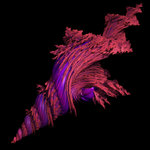| Author
|
You can't fix it in the mix!
|
Xamanist
Xamanist

Started Topics :
49
Posts :
938
Posted : Nov 14, 2007 13:33
|
Quote:
|
On 2005-04-26 17:29, Spindrift wrote:
I totally agree amygdala.
I have been going on abou the same thing a few times in here as well.
IMO the vast majority of beginners demos I hear is suffering badly from too much eq and compression and would most likely sound a lot better without anything.
Also much of the releases have in my taste far too controlled dynamics a clinical EQing. It's done in a professional way rather than with feeling many times.
Ideas like "taking out everything below 70hz make the bass punchier" or "eq all leads at 400hz to not cause phase shift in the bass region" or "compress all leads with a bit varying dynamics so no masking will happen" is really resulting in a very boring mix in the end that have very little depth and feeling in it.
A lot of the pop on the radio is more experimental and have rougher production than for example the spun crew.
The search for good sounds and synths and nice sounding software/hardware is a lot more important when it comes to making a nice mix.
It seems like it sounds to some like there is no skill required if you don't use every available tool to shape the sounds.
I do think that finding good sounds that fit together is enough of a skill and actually harder work many times than learing how to compress or EQ a sound that needs treatment.
My favorite synths is normally the ones with envelopes and frequency response that I lika and I hardly ever need to EQ or compress.
A sound that is really fat, ie have a packed amplitude scale and frequency spectrum, is just not possible to make fatter with compressors or EQs. It's only possible to make it thinner and thats what happens many times with untrained ears with less than ideal monitoring trying to compensate a great sound to suit less great circumstances.
Sure some times you want to have thinner sounds, but you are better off to start with a thin one then.
And sure you can beef up a thin sound as well, but if you have a fat sound to start with you will get a better result.
It all reminds me about metal guys practicing Yngwee Malmsteen solos all day on a really cheap and crap sounding guitarr.
Sure, if you get the teqnique you can do ok stuff on any guitarr.
But if you have a great sound you hardly need to play and can just hit a note and people will be astonished.
To find that guitar sound can take just as much effort as learning to play "the flight of the bumble bee" as fast as possible, but will in my taste result in music that speaks more to me at least.
|
|
WORD! |

|
|
Seamoon
Seamoon

Started Topics :
23
Posts :
314
Posted : Nov 14, 2007 16:55
|
i think everybody have to find his own method how he likes it...
I like controlled dynamics in electronic dance music (and i'm saying that as a drummer playing earlier in a jazz trio).
also i almost cut on every track the lows except it has absolutley no lowend in it (or the bassline isn't playing at that moment).
do i now sound like any other idiot boy-band on the local hitradio??? |

|
|
PoM
IsraTrance Full Member

Started Topics :
162
Posts :
8087
Posted : Nov 14, 2007 19:54
|
|
in production i think it s great to have your own sound,so just tweak your stuff how you like it. |

|
|
Psytracked
Inactive User

Started Topics :
5
Posts :
424
Posted : Nov 16, 2007 22:11
|
Quote:
|
On 2007-11-14 02:14, Spindrift wrote:
For creative compression when you want obvious pumping most compressors simply will not achieve that effect, no matter how much you tweak them.
They are usually designed to be transparent because they are commonly are used for smoothing out for example a vocalist who don't keep the same distance to the mic all the time, but without obvious artefacts.
I mostly use that kind of compression on sounds which have modulations that make it hard to control the dynamics, like filter tweaking or phasers.
Then the point then is that it should just sound a bit smoothed out.
For obvious pumping which can be nice on for example drum loops you have to use a compressor that is good at that kind of effect, like the Sonalksis TBK3 for example.
|
|

I agree with nearly all of what you have said. If your after compression as an effect then you do need to explore several options to find the sound that suites you. In the case of hardware, and perhaps analogue modeled software, you can use compression to control the dynamics or to pump as well as just warming a signal up. Tube compressors are popular for this. The bit I disagree with is the singer and mic distance. In the days of tape and 16bit digital tracking, compression was applied while recording to prevent overload, the human voice is a very dynamic instrument. A singer who has trained to move back from the mic when they are singing louder was considered more professional and enabled the engineer to use more gentle compression settings going to tape. The one downside of this can be when the room isn't very dead which can lead to alterations of the voice vs room ambience. With 24 bit the dynamic range is so great that you can track without compression and not worry about overloading. You can then experiment later in the mix to find the sound your after. Having said that many producers still compress vocal lightly while tracking at 24bit. The argument for this is that your committing earlier and don't leave yourself too open for creative decisions and therefore may work more efficiently. If recording at home I prefer the singer to keep a constant distance as my room is a bit too live. I also prefer not too compress while recording but then I started in the digital domain and don't like the idea of messing the dynamics up on a good take. A more experienced engineer may be more confident with the compressor and therefore commit to wav./aiff/tape while recording. I guess you could say just do what ever your happiest with. If it sounds right then it probably is right.

        http://www.whatacunt.co.uk/ http://www.whatacunt.co.uk/ |

|
|
Spindrift
Spindrift

Started Topics :
33
Posts :
1560
Posted : Nov 17, 2007 00:24
|
Of course your right in that a vocalist varying the distance doesn't have to result in more varied dynamics and rather the opposite if his/her mic technique is good.
The point was really that traditionally compression has mostly been used to control signals with fluctuating dynamics from sources hard to control and hence most compressors is designed to leave as little artefacts as possible.
With synthesizers it's quite easy to control the dynamics without a compressor most of the time, in which case the need for compression as a tool is rather than an effect is less common.
It was a few years since I worked with recording instruments and vocals, but the real limitation nowadays when it comes to how wide dynamic range you can record is in the analogue chain.
Good equipment will have a bit higher dynamic range than 16 bit audio, but still some way to go to make use of 24 bit resolution.
        (``·.¸(``·.¸(``·.¸¸.·`´)¸.·`´)¸.·`´) (``·.¸(``·.¸(``·.¸¸.·`´)¸.·`´)¸.·`´)
« .....www.ResonantEarth.com..... »
(¸.·`´(¸.·`´(¸.·`´``·.¸)``·.¸)``·.¸)
http://www.myspace.com/spindriftsounds
http://www.myspace.com/resonantearth |

|
|
shellbound
IsraTrance Junior Member

Started Topics :
14
Posts :
601
Posted : Feb 27, 2009 21:42
|
Quote:
|
On 2005-04-26 14:27, PoM wrote:
i think it must sounds good without mixing, that way after mixing it sounds great , but if it sounds shit it ll still sounds shit in my opinion.
|
|
yeah. like br0d said, fix it as close to the source as you possibly can.
quality thread. |

|
|